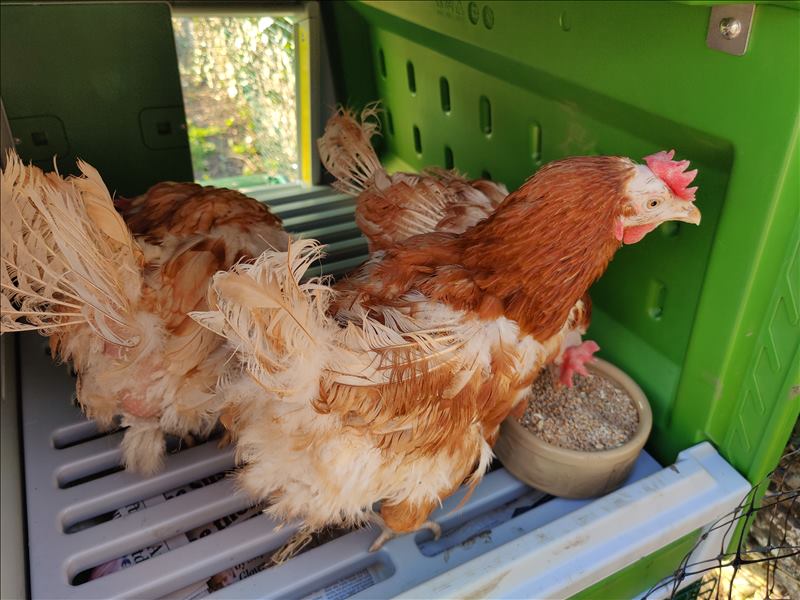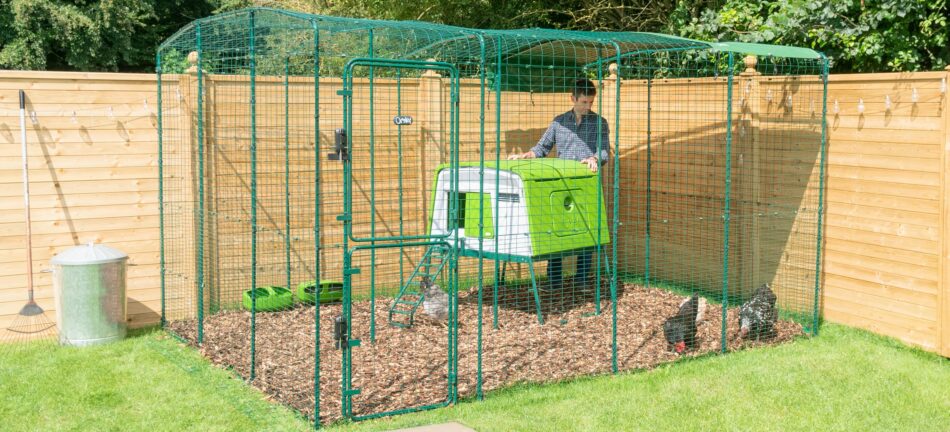6 top tips for rescuing hens
Have you considered rescuing chickens? Whether you’re just starting out with a flock, or growing an established one, adopting hens can be an emotionally rewarding experience. Hens can be in need of rescue for a number of reasons: owner surrender or confiscation, retiring breeding or laying hens, or chickens with special needs – there are chickens in search of their forever homes. We’ll share our 6 top tips for rescuing hens, and show you how Omlet can support them, and you, in the journey.
1. Find the perfect chicken coop
Creating the perfect setup for rescue hens is essential in helping them adjust to their forever home. Hens in need of rescuing may have been confiscated by law enforcement due to neglect or unsuitable living situations or may be leaving a noisy egg production facility. No matter what their story may be, all rescued hens will be in desperate need of a safe place to land.
Having an Eglu Cube chicken coop ready for your hens’ arrival will provide them with peace and comfort from the start. With its elevated design and secluded egg-laying area, hens can find rest in the shade and a secluded place to lay their eggs privately. The attached run offers space to peck at the grass – which may be something rescued hens have never experienced before. The Eglu Cube is also available as a chicken tractor to offer your newly rescued hens fresh patches of grass and a new selection of insects to munch on.
Adding an automatic chicken coop door will help your hens feel even more secure overnight. The gently closing door will tuck them in tight and keep potentially stressful sights and sounds from keeping them awake. And, with the ability to open and close on a light or timed schedule, rescued hens can seize the day at the crack of dawn while you sleep in.
2. Give them plenty of space
Space is not something generally afforded to hens that are coming from less-than-ideal living conditions. Whether they’ve been crowded or caged, your newly rescued hens will appreciate having some room to spread out. And, as their new owner and forever-home-provider, you’ll want to spend time with them in their setup.
Our Walk In Chicken Run gives rescued hens the space they deserve, while giving you the opportunity to spend time with them. The convenient and secure stable-style doors let you access your hens with ease, and the fully enclosed run keeps your hens safe from predators. The anti-dig skirting helps prevent predators like weasels and foxes from tunnelling in, and the roof panels keep aerial predators away from your flock.
Customise their walk in run with chicken perches, the PoleTree customizable chicken perch, or Freestanding Chicken Perch for unparalleled perching opportunities. Perches or chicken toys and the enrichment they provide are probably elements that rescued hens have never encountered before, but are excellent ways to let your new flock members know that they are loved and safe in their new home.
3. Allow them to settle
Depending on their previous living conditions, rescued hens may take longer to settle into their new homes than those raised in ideal situations. At first, they may be distrustful of humans – either from negative experiences or lack of contact. Give them plenty of time to become used to seeing you. With patience and routine, your rescued hens will soon figure out that you mean them no harm.
As tempting as it may be to get to know your new chickens, don’t attempt to handle or pet rescued hens for the first week or two. Chickens make great family pets, but children should be taught how to handle hens properly and to respect their space when needed. Rescued hens will be overwhelmed enough trying to get used to their new surroundings, so incorporating unfamiliar physical contact may be too much for them. Instead, try to sit quietly with your flock while they eat or peck in the grass. Speak softly to them to get them used to your voice. Over time, you can offer treats or scratch grains by hand – just make sure to let your hens come to you.
4. Understand the pecking order
Chickens are social animals that have a hierarchy within their flocks known as the “pecking order.” To new chicken keepers, the act of establishing this pecking order may be confusing or even concerning to witness. To understand the pecking order in your hens, you’ll need to watch them closely when introducing them – both to each other and to a new home. Normal behaviours for chickens establishing a pecking order include:
- Raising the feathers around their neck
- Squaring off with each other through posturing or staring
- Squawking or clucking at each other
- Brief scuffles that include sparring and/or feather pulling
Every flock has a pecking order, which can be challenged periodically even once it’s established. It’s normal to see minor and short-lived disagreements within an established flock, but chickens should be separated from each other if:
- Physical altercations occur more often than once or twice a day for consecutive days
- Bleeding or extreme feather pulling occurs
- Dominate hens are keeping other hens from coming into the coop to roost or lay eggs (even the “top ranking” hens should see that the lowest ranking hens have a safe place to sleep and lay)
- Flock members are keeping others from eating or drinking
5. Keep an eye on their health
If you’re adding rescued hens to your own backyard flock, you’ll want to be absolutely sure they’re healthy first. All new chickens should be quarantined away from your flock for 14 days to make sure they don’t have anything contagious. Consider having a secondary chicken setup such as the Eglu Go chicken coop to quarantine new hens, or to separate ill or fighting flockmates.
Even if your rescued hens are your first flock, you’ll want to give your chickens a health check before releasing them into their setup. Once they’re in their forever home, keep a close eye on them to make sure they are eating, drinking, and acting normally.
The appearance of rescued hens varies, but some common ailments seen in rescued hens include:
- Dull or missing feathers
- Clear, thin discharge from the eyes or nose
- Irregular gait or hesitant to walk much (usually due to being confined in a wire cage – their feet may be sore and their legs weak)
These minor discomforts should resolve within a week or two after eating a nutritious diet. If your hens don’t improve, or get worse, be sure to call your veterinarian.
6. Provide them with the right diet
Feeding your hens a nutrient-dense diet will help them feel and look their best. If they are a laying breed of chicken, be sure to feed them quality laying pellets containing 16-18% protein. Your hens can have feed left out for them all day – even rescued hens that may have been deprived of food will not overeat. It’s also helpful to feed chicken supplements to help hens bounce back from stress. Protein-rich treats like dried mealworms or scratch grains will help hens feel more energised – and are also a great bargaining chip when it comes to winning their trust.
As with any flock, make sure rescued hens have unlimited access to fresh water. Adding a small amount of apple cider vinegar to their water will help boost your hens’ immune system and help them grow healthy feathers. You can also toss herbs like fresh oregano into their water or feed for an added immunity boost.
Where to rescue hens
There are various resources when it comes to adopting rescued hens. A great place to start would be your local animal control office or animal shelter. Hens are sometimes surrendered to an animal shelter, or animal control officers may remove chickens from poor living situations and will care for them at the shelter until they are adopted. Other resources for finding hens to adopt include:
- Chicken rescue groups (found online)
- Egg production facilities that retire hens after their peak laying age (usually around 2 years old)
- Hatcheries that are retiring breeding hens (these hens are usually well cared for, but in need of a forever home)
- Individuals seeking to rehome their flocks due to circumstances
Omlet and your rescue hens
Adopting an animal in need is a beautiful thing. Rescuing hens from dire situations or temporary care and bringing them to their forever homes is a balm for both chickens and their keepers. Omlet’s Eglu Cube, Walk In Chicken Run, and Autodoor will help your rescued hens feel safe and secure from the first moment in their new setup. A difficult living situation can be turned into a distant memory with your love and care, and with our chicken products that are designed to help hens live their best lives.
This entry was posted in Chickens

